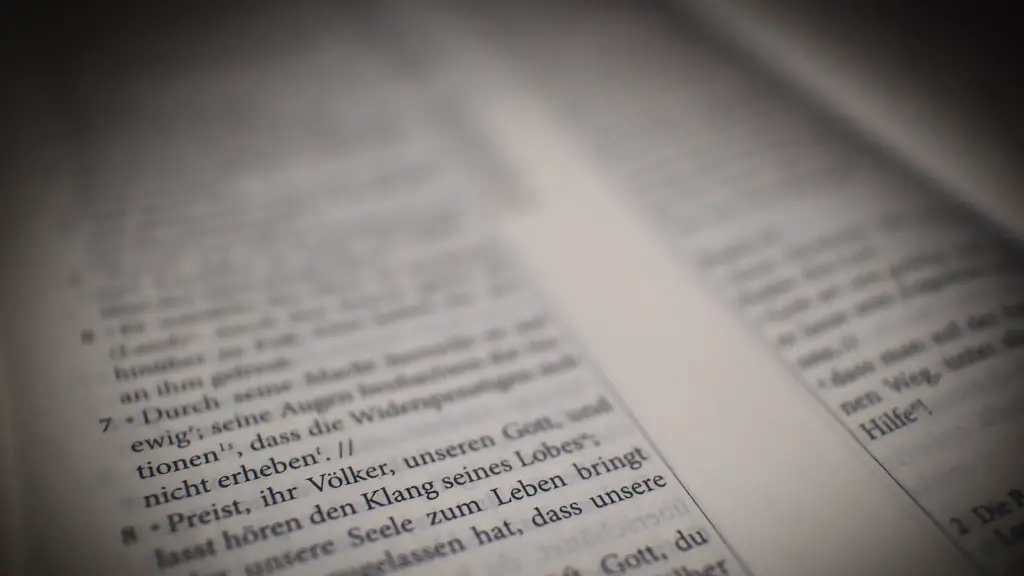What Is Folly In The Bible
Folly is an important concept in the Bible, though it is not always easy to understand. The word “folly” comes from the Greek “mōria,” which means “lack of understanding” or “stupidity.” In the Bible, it is used to describe someone who does not understand God’s instructions or has acted without wisdom. In other words, folly is the opposite of wisdom. In the Bible, it is often seen as a form of rebellion against God, as those who are foolish are not living according to God’s laws.
The Bible is full of examples of folly. In Proverbs, Solomon speaks of folly as the way of fools, who are “ruined by their own lack of understanding.” He also speaks of the folly of trusting in oneself, which leads to destruction. In the book of Ecclesiastes, it is said that the “foolish person walks in darkness,” and that “folly is a joy to the mockers.” In the books of Job, Psalms, and Isaiah, there are references to “the fool” and “the man of folly.”
Folly can also refer to foolish behavior, especially behavior that goes against God’s commandments. For example, when Ahab, a king of Israel, married Jezebel, an idol worshipper, the prophet Elijah denounced him for his foolishness. Similarly, when the Israelites worshipped idols, it was considered folly in the eyes of God.
The Bible warns us against the dangers of folly. Proverbs warns that “he who perverts justice by bribery is a fool, and in so doing, will destroy himself.” It also cautions against pride and presumption, which can lead to destruction and shame. Jesus also warned against foolish behavior, such as placing faith in man-made religious traditions and rejecting God.
Folly is often manifested as a lack of fear of God. In the Bible, fear of the Lord is seen as the beginning of wisdom. Those who lack fear of the Lord are not living in accordance with God’s laws and will eventually suffer the consequences. The Bible also warns against the dangers of following the foolishness of others. “Do not imitate the behavior of fools,” it cautions, “for you will become like them.”
Folly is ultimately a sign of ignorance and disobedience. Those who are foolish are not seeking God’s will and are not living in accordance with His commands. In the end, they will be judged according to their actions.
What Are The Consequences Of Folly In The Bible?
The Bible speaks of the grave consequences of folly. In Proverbs, Solomon states that “a fool’s way leads to destruction.” Those who are foolish will suffer for their lack of understanding and lack of wisdom. In the book of Job, God warns that “the fool will be destroyed in his own folly.”
The Bible also speaks of the destruction that folly brings upon others. In Proverbs, Solomon cautions that “one who mocks the poor shows contempt for their Maker.” In the book of Proverbs, it is said that those who despise wisdom and instruction will “pay the penalty.” This can refer to physical, spiritual, and even eternal consequences. Those who are foolish are warned against bringing destruction upon themselves and others.
Folly can also lead to dishonor, shame, and embarrassment. In the book of Proverbs, it is stated that “folly is joy to the one who lacks sense.” This can refer to those who act foolishly and bring shame upon themselves and those around them. Jesus taught that the “wicked will be thrown into outer darkness” where there is “weeping and gnashing of teeth.” This can refer to the shame and humiliation that comes from foolish behavior.
Ultimately, folly leads to destruction and chaos. In Proverbs, it is said that “a fool’s way leads to ruin.” Those who are foolish are warned not to “follow the way of the wicked” otherwise they will “end up in the grave.” Folly is something that must be avoided at all costs.
What Does The Bible Say About Fools And Folly?
The Bible is full of warnings about fools and folly. In Proverbs, it is said that “the fool’s way leads to destruction.” Those who are foolish do not understand God’s laws and are prone to make mistakes that lead to ruin. Jesus also warned against foolishness, saying, “be wise as serpents and harmless as doves.”
The Bible also warns against following “the way of fools.” This can refer to people who are unwise and do not follow God’s instructions. Proverbs also cautions against “the way of the wicked” which can lead to destruction. In the book of Proverbs, there are warnings about those who “follow the way of the transgression,” as it will lead to punishment and ruin.
The Bible also speaks of the wise and foolish people. Those who are wise seek out knowledge and understand God’s commands. They are careful in their actions and do not act rashly. On the other hand, those who are foolish do not think of the consequences of their actions. They are unwise and do not understand the dangers of their actions. In the end, they are “ruined by their own lack of understanding.”
The Bible also emphasizes that foolishness leads to punishment. In Proverbs, it is said that “the wages of the wicked are sin and the punishment of fools is foolishness.” This can refer to physical, spiritual, and even eternal consequences. Those who act foolishly will be judged harshly and punished for their lack of understanding.
Final Thoughts On Folly In The Bible
Folly is an important concept in the Bible, and it is important to understand what it means and the consequences it brings. The Bible warns against foolishness and those who lack understanding of God’s laws and His commands. Foolish behavior often brings shame, dishonor, and destruction. Those who are wise, however, will seek to understand God’s will and will live a life that honors Him.
How To Avoid Foolish Behaviour According To The Bible
The Bible has much to say on how to avoid foolish behaviour. Proverbs encourages us to “walk in wisdom and not in the way of fools.” This can be done by gaining knowledge and understanding of God’s ways and obeying His commandments. Jesus also taught us that we should be “wise as serpents and harmless as doves” instead of being led astray by foolishness.
The Bible also warns against pride and presumption. It advises us to “trust in the Lord with all your heart and not lean on your own understanding.” This can help us to avoid making foolish mistakes and relying on man-made traditions. It encourages us to “keep our eyes on the Lord and turn away from evil.”
In summary, the Bible encourages us to be wise in all our conduct. We should seek to understand God’s ways and live according to His commandments. We should also strive to have a humble and teachable attitude and not be presumptuous in our actions. By avoiding foolish behaviour and trusting in the Lord, we can live a life that pleases God.
Folly In The Bible And The Church Today
Folly is an important concept in the Bible and has implications for how the Church should live today. The Bible encourages us to be wise and seek understanding, and so churches need to make sure that their teaching on the Bible is faithful to Scripture. Churches should also strive to teach people the right way to live according to the Bible and to avoid foolish behaviour.
The Church should also strive to avoid foolish decisions when it comes to matters such as finances or strategic planning. In the parable of the talents (Matthew 25:14-30), Jesus spoke of the need to be wise when it comes to decision-making. Churches must strive to make wise decisions and avoid foolish ones, in order to honour God and remain faithful to His word.
Finally, the Church must also strive to recognize folly when it is present. It is important for churches to be aware of behaviours and attitudes that defy God’s instructions and lead to destruction. By recognizing folly when it is present, churches can be better equipped to avoid it and to help people turn away from foolishness and instead seek after God’s will for their lives.
The Power Of Wisdom In Contrast To Folly
In the Bible, fools often lead to destruction, but wisdom can be powerful. Proverbs states, “the fear of the Lord is the beginning of wisdom.” Those who seek and understand God’s ways are wise and will bring glory to His name. The Bible also tells us that “in all your ways acknowledge Him, and He will make straight your paths.” This means that even in the most difficult of times, God will be our guide and help us make wise decisions.
Additionally, the Bible speaks of the need to be wise, even when others are not. Proverbs states, “do not be wise in your own eyes; fear the Lord and turn away from evil.” This means that even when those around us are acting foolishly, we should not be led astray. The Bible teaches us to be wise and to make decisions that are in line with God’s will.
Finally, the Bible also speaks of the power of wisdom. Proverbs states that “the wise man has great power, and a man of knowledge increases strength.” This can refer to spiritual strength, as understanding God’s ways leads to peace and joy. Additionally, it can refer to physical strength, as wisdom enables us to make choices that are beneficial to us. By being wise and understanding God’s will, we can find strength and guidance even in the toughest of times.





